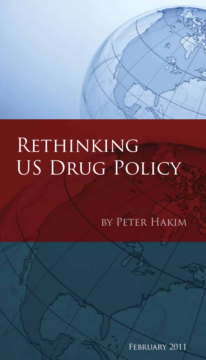
Rethinking US Drug Policy
US citizens today are clearly unhappy with their government’s anti-drug policies.
A Daily Publication of The Dialogue
Four U.S. citizens were kidnapped in Mexico on March 3, two of whom were later found dead after gunmen allegedly belonging to the Gulf Cartel opened fire. The incident led members of the U.S. Congress to call for troops to be sent into Mexico to stem drug cartel violence, which Mexican President Andrés Manuel López Obrador strongly rejected. On March 13, Mexican Foreign Minister Marcelo Ebrard spoke with Secretary of State Antony J. Blinken to discuss bilateral efforts to address the fentanyl crisis more broadly. How is the rising political tension between the United States and Mexico over the opioid crisis affecting their bilateral relationship? How has cooperation evolved between the two countries, and what policies are needed to effectively address the fentanyl crisis?
Arturo Sarukhan, board member of the Inter-American Dialogue and former Mexican ambassador to the United States: “Counternarcotics cooperation and intelligence sharing between Mexico and the United States is in a rut. Since the outset of the López Obrador administration, it has been a chronicle of a crisis foretold. It was hampered out of the gate by a nationalistic and jingoistic approach as López Obrador largely eviscerated cooperation with Washington, only for it to nosedive in response to the arrest of a former Mexican secretary of defense in Los Angeles. And while the Biden administration has been pressing Mexico for months on the flow of precursors and fentanyl into Mexico and then on to the United States, Mexican authorities, starting with the president himself, have largely been performing kabuki. This is in part because interdiction and lab dismantling policies run counter to López Obrador’s ‘hugs, not bullets’ approach to transnational criminal organizations, but also because he feels he wields significant leverage in the relationship due to his support of U.S. requests to stem migrant flows headed to the border. The incident in Matamoros simply turbocharged the growing frustration over Mexican policies in the matter. To make things worse, the debate in both countries has, firstly, reverted to mutual recriminations and finger pointing, ignoring that transnational challenges can only be met with transnational solutions based on a paradigm of shared responsibility. Second, López Obrador argues that cooperation can only occur if there’s trust, when in U.S.-Mexico ties it is cooperation that builds trust. Third, this latest crisis shows that both countries face a serious problem because they do not share a common diagnosis or estimates of what the fentanyl challenge really looks like on the ground, an issue compounded by recent revelations in Mexico that suggest the army has been cooking the books when it comes to seizures of fentanyl and the dismantling of labs.”
Stephanie Brewer, director for Mexico at the Washington Office on Latin America: “Effectively addressing the fentanyl crisis means making policy decisions and measuring results based on reductions in overdose deaths and related harms. This requires responding to fentanyl with a public health approach focused on vastly increased access to robust harm reduction services and treatment for substance use disorder. Rather than increasing criminalization—which acts as a barrier to accessing life-saving aid and services—drug possession and use should be decriminalized. Some of these concepts are already recognized in the U.S.-Mexico Bicentennial Framework for Security, Public Heath and Safe Communities. Proposing military strikes or actions in Mexico is the farthest thing from a serious and effective approach to saving lives from drug overdoses. Decades of experience have shown the failure of a militarized ‘war on drugs’ in Mexico and the region. Current calls for U.S. military action in Mexico won’t alleviate the fentanyl crisis; on the contrary, they increase tensions in an already-fraught security relationship that should be focused on improving cooperation to reduce violence caused by organized crime. Further, even if the two governments can significantly improve information-sharing and collaboration to help reduce illicit fentanyl production and trafficking from Mexico, supply reduction through law enforcement will remain incapable of meaningfully staunching fentanyl availability in the United States. Fentanyl’s spread is the latest and most lethal demonstration of the ‘Iron Law of Prohibition,’ whereby supply suppression efforts favor the introduction of more compact and more potent substitute drugs—easier to conceal, more difficult to detect and even more profitable for the suppliers.”
Earl Anthony Wayne, retired career ambassador and public policy fellow at the Woodrow Wilson International Center for Scholars and co-chair of its Mexico Institute Advisory Board: “U.S.-Mexico relations face serious challenges spanning issues from trade and migration to border violence and drug trafficking. But the most dangerous threats surround trafficking synthetic opioids, such as fentanyl, and the violence that trafficking fuels in Mexico. The United States should press for an urgent high-level agreement to produce more effective U.S.-Mexico security cooperation with measurable progress on fentanyl and other problems including illicit arms and money flows. Synthetic opioids killed more than 70,000 Americans in 2021. Fentanyl seizures at the southwest border rose over 500 percent from 2019 to 2022. 2023 fentanyl seizures are on track to set a record, despite a 2022 U.S.-Mexican security action plan. Mexico’s criminal trafficking groups also fuel violent homicides in Mexico, which have exceeded 30,000 a year since 2019. U.S. officials and analysts report a deteriorating situation with arm’s length bilateral cooperation. The lack of effective collaboration against transborder crime feeds the calls for designating Mexican trafficking groups as Foreign Terrorist Organizations and in turn generate defensive retorts by Mexico’s president. Unilateral action should be held in reserve, however. Washington and Mexico City should forge a priority initiative to significantly improve the results of collaboration, despite the previous reluctance of Mexico’s president. They should address forthrightly issues holding back U.S.-Mexico anti-crime cooperation, including persistent mistrust, inability to tackle corruption and weak, uncoordinated law enforcement and justice institutions. The United States should also continue more aggressive sanctions use. U.S.-Mexico negotiations are reportedly underway. This is worth trying, and U.S. retains unilateral options.”
Vanda Felbab-Brown, senior fellow for foreign policy at the Brookings Institution: “On March 27, newspaper reports began circulating that the United States and Mexico were on the verge of announcing a ‘new’ deal to fight fentanyl flows. But whether any actually announced deal will be more than thin gruel remains to be seen. If the deal mostly restates Mexico’s interpretation of the Bicentennial Framework, cooperation will remain inadequate. Reuters revelations this month that the Mexican military was problematically altering its accounting of how many fentanyl/methamphetamine labs it busted should further raise skepticism about the adequacy of Mexico’s actions without robust operational presence of the Drug Enforcement Administration (DEA) in Mexico. To be watched is whether Mexico will become more reliable in sharing samples from declared precursor and fentanyl seizures, begins conducting controlled delivery operations, allows DEA agents at least to observe and ride along on interdiction raids, and starts acting more systematically on U.S. intelligence. Also yet to be understood is what authority the U.S. Homeland Security Investigations agency has and will have to operate in Mexico since the agency is sometimes talked about as an adequate replacement for DEA operations that the Mexican government has shackled. For example, will Homeland Security Investigations be able to ride along on Mexican law enforcement operations, or will it be mainly focused on countering weapons and financial flows to Mexico? The latter would again leave a problematic lack of visibility into the actions the Mexican government claims to be undertaking.”
Gary J. Hale, nonresident fellow in Drug Policy and Mexico Studies at Rice University’s Baker Institute for Public Policy: “The U.S. Centers for Disease Control recently reported that 107,735 Americans died between 2021 and 2022 from drug poisonings, with 66 percent of those deaths attributed to synthetic opioids like fentanyl. In an attempt to deflect responsibility, Mexican President López Obrador (AMLO) recently claimed that fentanyl is not made in Mexico. However, it commonly known that the Sinaloa Cartel and Cartel Jalisco Nueva Generación are unquestionably the two criminal organizations responsible for importing Chinese precursor chemicals into Mexico that are synthesized to produce fentanyl and that subsequently export the deadly drug into the United States. Aside from an occasional lab that the Mexicans are directed to by U.S. intelligence, AMLO has done little to provide viable solutions to the fentanyl problem and shows no interest in cooperating substantially with the United States on drug policy, trade, migration and other issues, thereby placing strain on the bilateral relationship. Mexico is definitively the source of finished fentanyl, but China also shares some responsibility for allowing precursor chemicals that are converted into the drug to be exported to Mexico. Both nations could make significant contributions toward saving lives, if they would put politics aside and develop policies that would recognize the dangers to humanity that illegal fentanyl represents. A significant step in the evolution of drug policy would be to prosecute Mexican cartel leaders and other drug illegal producers for genocide, given that countless deaths have been caused by fentanyl and other dangerous drugs that are sold throughout the world.”
Arantza Alonso, senior analyst for the Americas at Verisk Maplecroft: “The U.S.-Mexico relationship not only encompasses a multitude of demanding topics–such as trade, migration and security–it is also underpinned by an asymmetric interdependence that makes it extremely complex. Despite verbal escalations and sore points following the kidnapping of four U.S. citizens by the Gulf Cartel in the border city of Matamoros on March 3, bilateral cooperation has carried on. Given the magnitude of shared interests–including growing U.S. investment in Mexico, driven by nearshoring, the fact that a record number of U.S. citizens are living in Mexico and that Mexican-American voters in the United States have reached almost 12 million–neither party can risk placing the other on hold. Nonetheless, we expect the opioid crisis to be politically weaponized. This crisis–which from January to September 2022 led to more than 79,000 overdose deaths in the United States–is widely attributed to Mexican organized crime groups, particularly by U.S. conservative groups. These groups tend to intensify their attacks against Mexico during electoral cycles. However, with elections also taking place in Mexico in 2024, both sides have little incentive to drop their guard and look weak in the eyes of their respective electorates. Effectively addressing the opioid crisis in the United States and insecurity in Mexico needs both countries to acknowledge their shared responsibilities. Policies focused on creating a more cohesive and solid defense against organized crime groups–such as addiction and violence prevention, weapons tracing and financial intelligence sharing programs; as well as collaborative law enforcement–should be prioritized.”
 The Latin America Advisor features Q&A from leaders in politics, economics, and finance every business day. It is available to members of the Dialogue’s Corporate Program and others by subscription.
The Latin America Advisor features Q&A from leaders in politics, economics, and finance every business day. It is available to members of the Dialogue’s Corporate Program and others by subscription.
US citizens today are clearly unhappy with their government’s anti-drug policies.
Is growing violence in Mexico and elsewhere in Latin America a sign of failures in drug policy? Has the Obama administration made any significant change in anti-drug efforts? What policies should it be pursuing?
The question remains if Mexico has achieved a degree of institutional development consistent with its participation in those organizations.
 Mexico’s foreign minister and the U.S. secretary of state recently discussed bilateral efforts to address opioid trafficking. A bag of fentanyl pills is pictured. // File Photo: U.S. Drug Enforcement Administration.
Mexico’s foreign minister and the U.S. secretary of state recently discussed bilateral efforts to address opioid trafficking. A bag of fentanyl pills is pictured. // File Photo: U.S. Drug Enforcement Administration.